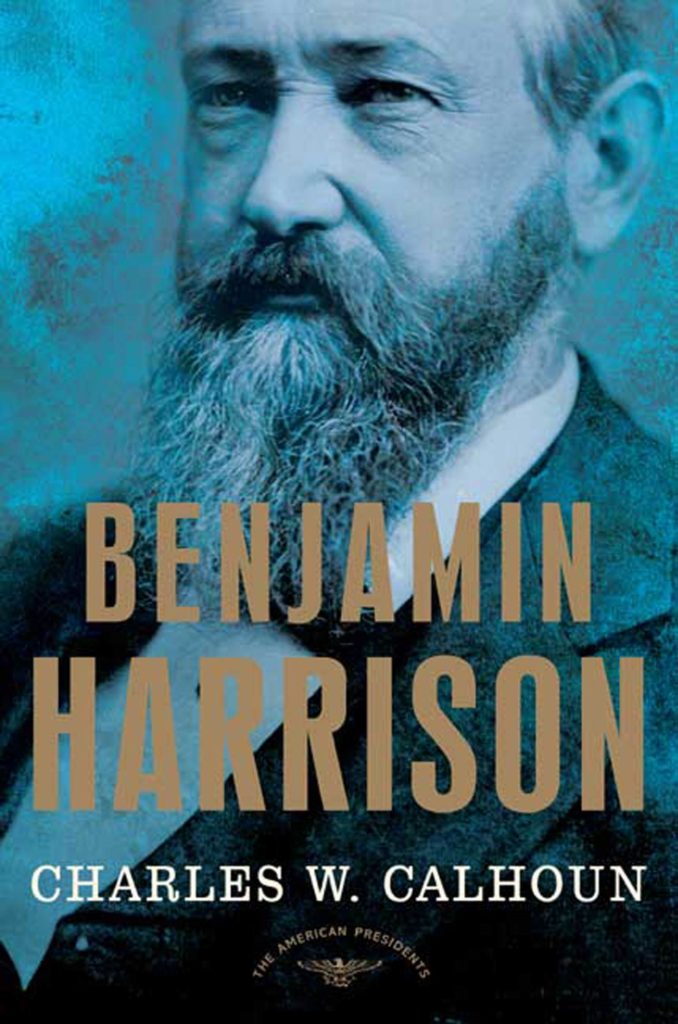“Fame is truly honorable and fortune only desirable when they have been earned. Charity-given bread may nourish the body but it does not invigorate the soul like the hard earned loaf.”
Benjamin Harrison
I don’t understand why Benjamin Harrison gets such a bad rap. I’m not lobbying to get the chisels out and head to Mt. Rushmore, but America could (and many, many times did) do much worse than BH when electing a president. As Charles Calhoun enlightened me in his biography, Harrison was much more than just “that guy in between Grover Cleveland’s terms.” The grandson of 31-day president William Henry Harrison and great-grandson of Benjamin V, signer of the Declaration of Independence, the Benjamin of 1888 was a bit of an anachronism. Straight laced and puritanical, an incorruptible teetotaler, the 23rd president held office during a Gilded Age known for grift and wonton excess. He may have been a cold fish and not very personable, but he got a lot done and his efforts for people of color are as laudable as any of his age.
Benjamin Harrison is mostly known for a slate of monetary policies. Heading into the 1880 election (to be Senator), it was brought to his attention that since 1866 the government had seen a revenue surplus due to higher tariffs put in place during the Civil War to cover military expenses. While Southerners wanted to ditch the tariffs, Harrison favored them to spur prices and wages for American products. He was keen to reduce the surplus and remove internal taxes on most everything except booze and tobacco.
Harrison sought to spend the surplus funds benevolently. His ideas included a Union veteran pension, building up the navy and merchant fleet, internal public projects including better navigation on the Mississippi, and a focus on education, especially to the South’s illiterate population. When an education bill that could fulfill the latter hope was created, he pushed for an amendment that would withhold funds from states that did not give equal opportunity across race. “Unless the black boy and girl in the South can share equally in the privileges of education, then I am opposed to the bill, because it will not reach the evil that we are endeavoring to eradicate.” The bill ultimately failed in the Democratic House, with members from the South leading the charge to defeat it.
The Tariff would continue to be incredibly divisive and Harrison would continue to defend it as “constitutional, wholesome and necessary” to “preserve the American market for American producers, and to maintain the American scale of wages.” It’s a great sales pitch and works in some sectors, but it also raises prices and consumers bear the brunt of more expensive goods. Tax too many things, life in general becomes much more pricey. The Democrats would hone in on this issue and take not just the next few elections, but much of the previously-Democrat electorate (like poor farmers barely scraping by) into their camp as well. (The Homestead Strike also hurt Harrison’s reelection effort because the workers were striking to combat low wages, which his tariffs were supposedly lifting up.)
On the racial front, Harrison’s views were front and center. In his first State of the Union he pressed Congress on what he felt was an absurdly delayed question. “When and under what conditions is the black man to have a free ballot? When is he in fact to have those full civil rights which have so long been his in law? When is that equality of influence which our form of government was intended to secure to the electors to be restored? This generation should courageously face these grave questions, and not leave them as a heritage of woe to the next.” Frederick Douglass even said of the man, “To my mind, we never had a greater President” and that Harrison’s efforts for black suffrage “should endear him to the colored people as long as he lives.”
In addition to the McKinley Tariff Act, Harrison guided through several other pieces of watershed legislation. The Sherman Anti-Trust Act, while not doggedly pursued in his term, would set up a framework of powerful anti-trust legislation for future reformers like Teddy Roosevelt. Also laying some groundwork for TR, the Forest Reserve Act dedicated 13 million acres of forest reserves during his administration. The Dependent Pension Act passed a pension for ex-soldiers (or if they had died, their family) that cost the government more than 40% of the annual budget by the end of Harrison’s term. This latter act is considered a cornerstone of future welfare policy in the United States. The 51st Congress (with both houses unified for the first two years of Harrison’s term) passed 531 public laws, the most in U.S. history until TR’s second term.
Benjamin Harrison won the White House despite losing a Senate seat just a year earlier. He lost the popular vote (but won the Electoral College handily and presumably would have gotten more black votes had they not been suppressed) and only won his adopted home state of Indiana by less than half of one percent. He wasn’t big on backroom deals, greasing palms or politicking in general. His wife fell ill and died just before his reelection bid and his heart, understandably, just wasn’t in the campaign. He lost for a lot of reasons, some of which are that his own party didn’t really like him and the tariffs he touted and monetary policies he pushed didn’t play out as promised. But hey, the guy deserves a lot more credit that he gets, if only for his integrity and volume and impact of the legislation he got passed. However, I’d imagine not having liquor at any of those White House parties was a real drag.
Trivia
- Fought in more battles in a month in the Civil War than his “war hero” granddad Old Tippecanoe fought in his life.
- Front porch campaign – people flocked to his house when he was the nominee and he would give a speech, have it written as he talked, review it and send it off to the Associated Press for publication. Slept in his own bed every night while getting his message across the country.
- In bid to retain the White House, he traveled more than 9,000 miles through 21 states and two territories, giving speeches to 140 audiences.
- Once in a court case (when he was still poor and really needed to win) the light was too low to read his detailed notes so he set it aside and free-styled an argument from memory and got the conviction.
- Served in Civil War as Colonel of 7th Regiment of Indiana Volunteers.
- A cholera epidemic was averted when the BH overrode state authority and held mandatory quarantine of ships hitting New York with cholera cases for 20 days and temporarily suspended immigration from infected European ports.
- View on Women – Said a “good criterion” for judging the “true state of society” was how it treats women as they “are appreciated in proportion as society is advanced.”
Follow-up Reading
- Harry J. Sievers’ Harrison trilogy
- Benjamin Harrison: Hoosier Warrior (Vol 1)
- Benjamin Harrison: Hoosier Statesman (Vol 2)
- Benjamin Harrison: Hoosier President (Vol 3)

